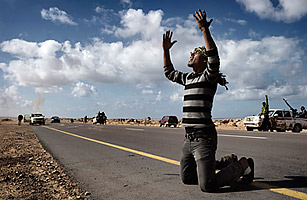
Death and taxes are always with us, and so are arguments about whether nations ever have the right or duty to intervene in the affairs of others. The case for “humanitarian intervention,” under a variety of names, has been asserted at least since the great powers threw their weight behind Greece’s struggle for independence in the 1820s, but in its modern form was developed during the Wars of the Yugoslav Succession, when it appeared to many that armed force was the only way to end terrible atrocities. More recently, the U.N. has adopted as a norm of international affairs the “responsibility to protect,” which contemplates the possibility of armed intervention when a state shows itself unable or unwilling to prevent grave human rights abuses.
The war in Libya has opened up the can of worms once more, with those on one side arguing that international forces can prevent or end great wrongs, while others assert that intervention is based on the inconsistent application of fuzzy principles and amounts to little more than imperialism dressed in a cloak of bleeding-heart piety.